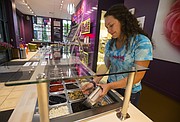Teens, summer jobs don't seem to mix
COEUR d’ALENE — It was almost 9 p.m., closing time for Cold Stone Creamery in Riverstone.
Two teenage boys stood behind the cases of ice cream, preparing to shut down the store for the night. Their hopes of going home on time were dashed as movie-goers piled into the store after the end of a show. The boys scrambled to keep up with the impatient patrons’ demands while trying to maintain customer-service-worthy grins.
It was a typical teen summer job moment, but fewer and fewer teens are experiencing those lessons and the trials that come from going to work when school is out.
Kootenai County employers are experiencing the effects of a national trend: The number of teens working summer jobs has been declining for the last 40 years.
At Silverwood Theme Park in Athol, where 65 to 70 percent of its 1,200-person team is younger than 24, managers have seen a 25 percent drop in the number of teen applicants over the past couple years, said Silverwood spokesman Mark Robitaille.
“Our HR guy attributed it to an array of things, but it starts with school sports, school activities and many schools now start in August, so we’ve seen a decrease there as well,” Robitaille said.
The U.S. Bureau of Labor Statistics reported earlier this year that the number of teens working during summer break has declined dramatically since the 1970s. The teen labor force participation rate nationwide in July 2016 was 43.2 percent. At its high point in July 1978, the rate was 71.8 percent.
One of the possible reasons for the decline cited by BLS analysts is that greater academic and extracurricular demands are placed on teens today. Plus, parents, lawmakers and other stakeholders are more focused on the value of education than they were in the past. As a result, teen school enrollment has risen while workforce participation has declined, especially during the summer months.
“More teens attend school during the summer now than in previous years. The proportion of teenagers enrolled in July 2016 was more than four times higher than it was in July 1985 — 42.1 percent versus 10.4 percent,” said the BLS report.
Kimberlyn Chadwell, manager of Grooveberries Frozen Yogurt in Riverstone, said a lot more effort goes into finding summer employees now, especially with a staff consisting entirely of high school students.
“This year we’ve had to reach out online and to close friends a lot more. We’ll have help wanted signs up and nobody will come in, so it’s hard to get a response from people unless I go online like on Craigslist or Facebook,” Chadwell said.
While employers are trying harder, teens just aren’t into it.
“People don’t really like to bring in resumes; they mostly just want an application, and if I ask them to bring a resume, they won’t come back in,” Chadwell said.
Cain Sanchez, Grille From Ipanema’s marketing manager, said in a phone interview he’s noticed recently that more teens are applying, but not enough.
“I’d say it’s been harder to get teens to apply; we have to try harder... A lot of people that work there have friends who come to apply,” Sanchez said. “But I feel like if we didn’t have that, it would be a lot harder for us to find people to work.”
Teens today are facing stiffer competition from adults in the work force, said the BLS report.
Mary Hansen owns both the Cold Stone Creamery here in Coeur d’Alene and the store in Spokane, where she has a harder time hiring teens because of Washington labor laws.
“I can’t hire as young of a workforce because they must be out of the stores by 10 o’clock at night, and we stay open until 10 o’clock, which is fine except we have an hour of cleanup after that, so it makes it very difficult for us to employ anybody under 18,” Hansen said of her Spokane store.
Teens also have less experience and availability than adults, which makes it more desirable for employers to hire older applicants for entry-level positions.
Madison Wirth, a sales associate at Tiffany Blue, said she noticed her 17-year-old sister and her friends work very little, if at all.
“She only works one day a week, if that. I think they prioritize their time over making money. I think their parents just give them money,” Wirth said.
The BLS backed Wirth’s speculation that as parents become more affluent — due in part to an increase in dual-income families and greater educational attainment — they’re more willing to allow their children to participate in extracurricular activities instead of working. Plus, the growing dependence on financial aid for college lessened the need for high school graduates to work for tuition money.
Ryan Christy, 18, mows lawns for his neighbors just to make some extra spending money, while Dakota Pfister, an 18-year-old Grooveberries employee, said college is the reason she has a job.
“In high school, a lot of us weren’t employed but now that we’ve graduated, a lot more of us have jobs; trying to save money for college and stuff,” Pfister said.



